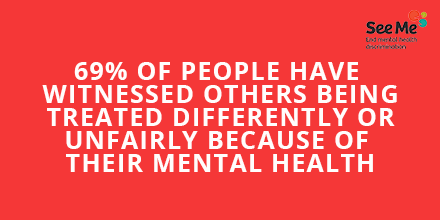Ending Mental Health Discrimination: Are We There Yet?
Posted by See Me, 30 May 2018

See Me’s strapline is “end mental health discrimination” and it seems we still have a lot to do to get there. Recently Our Voice gave us the opportunity to ask some questions about people’s experiences of stigma and discrimination. On the one hand we found some real encouragement in the responses. For example 90% of people would be comfortable now talking to another person about that person’s mental health. And 94% of people would be willing to speak to a health professional about a mental health problem. So it seems that attitudes are changing and we’re chipping away at mental health stigma.
Disappointingly though 69% of people witnessed different or unfair treatment because of mental ill-health.
That’s a truly shocking figure. We all have mental health and it changes during our lifetime. None of us should be treated unfairly as a result. Less equal treatment is also illegal under the Equality Act in yet this figure seems to suggest a lack of focus and proactivity to end mental health discrimination within the institutions that affect the major aspects of our lives; education, work and care. Our volunteers tell us too many stories that back this up often in places that have a duty of care like school or at the Doctor’s.
So why is this? My theory is that for too long mental ill-health has not been given enough focus in policy, practice and leadership. It is often absent in for example workplace policies or the public duties statutory organisations are required to develop. Of course those things don’t end discrimination on their own but the absence of training, clear expectations and policies to back them up is essential to leading the cultural change we need.
What See Me often finds though is a lack of knowledge and confidence on the part of professionals.
This reminds me of much earlier times working on LGBT equality – some people were clearly prejudiced and resistant to change. But many others just needed some help, knowledge and confidence. Many others responded well to leadership by a Chief Constable, a Health leader or the politicians at the time who were willing to show leadership. High profile celebrities speaking out and volunteers leading the charge made a huge difference too.
Mental health discrimination has many of these things in place but not enough of them.
That’s why at See Me we’re increasingly focusing on the institutions that acutely affect our lives. We will work with more and more people in health, care, education and employment. But we’ll need them to show leadership too, to improve training, policy, practice and lead the cultural change themselves. I’m confident more and more will but for now the 69% experiencing unfair treatment should act as a salutary reminder that change is needed now more than ever.
Calum Irving (Director)
